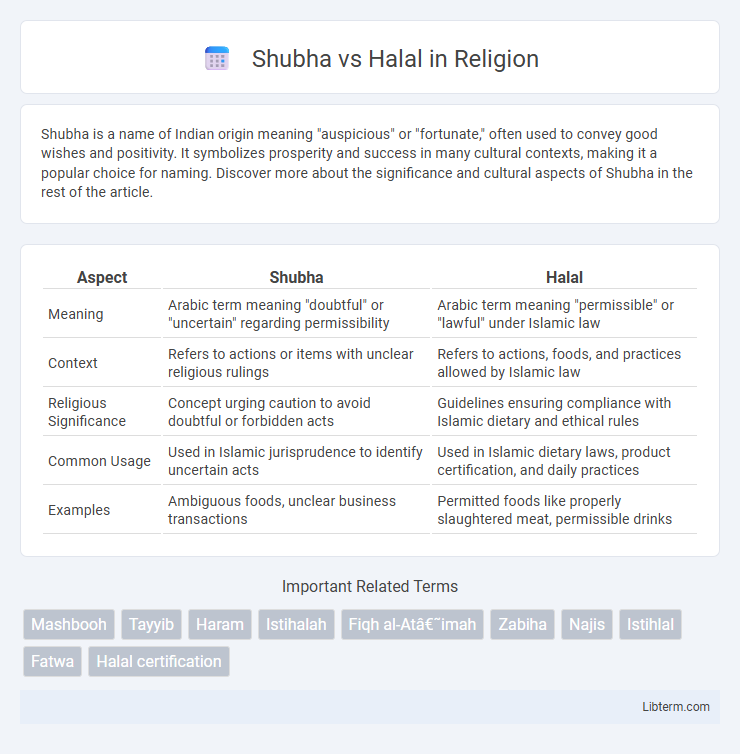Shubha is a name of Indian origin meaning "auspicious" or "fortunate," often used to convey good wishes and positivity. It symbolizes prosperity and success in many cultural contexts, making it a popular choice for naming. Discover more about the significance and cultural aspects of Shubha in the rest of the article.
Table of Comparison
| Aspect | Shubha | Halal |
|---|---|---|
| Meaning | Arabic term meaning "doubtful" or "uncertain" regarding permissibility | Arabic term meaning "permissible" or "lawful" under Islamic law |
| Context | Refers to actions or items with unclear religious rulings | Refers to actions, foods, and practices allowed by Islamic law |
| Religious Significance | Concept urging caution to avoid doubtful or forbidden acts | Guidelines ensuring compliance with Islamic dietary and ethical rules |
| Common Usage | Used in Islamic jurisprudence to identify uncertain acts | Used in Islamic dietary laws, product certification, and daily practices |
| Examples | Ambiguous foods, unclear business transactions | Permitted foods like properly slaughtered meat, permissible drinks |
Understanding Shubha and Halal: Definitions and Origins
Shubha refers to doubtful or ambiguous matters in Islamic jurisprudence, originating from the Arabic term meaning "doubt" or "uncertainty." Halal denotes what is permissible or lawful according to Islamic law, derived from the Quran and Hadith, serving as a guideline for ethical consumption and behavior. The distinction between Shubha and Halal is crucial for Muslims to navigate issues where legality is unclear, ensuring adherence to religious principles.
Key Differences Between Shubha and Halal
Shubha refers to doubtful or ambiguous cases in Islamic jurisprudence where the permissibility of an action is unclear, whereas Halal signifies what is explicitly allowed and lawful under Islamic law. The key difference lies in certainty; Halal denotes clear permissibility based on Quranic injunctions and Hadith, while Shubha involves uncertainty requiring caution to avoid potential sin. Understanding these distinctions is crucial for making informed decisions adhering to Islamic ethical and legal standards.
The Importance of Halal in Islamic Dietary Law
Halal in Islamic dietary law signifies permissible foods and practices strictly outlined in the Quran and Hadith, guiding Muslims to consume only what is spiritually and physically pure. The importance of halal lies in its role in maintaining religious obedience, promoting health, and ensuring ethical treatment of animals during slaughter. Understanding the distinction between Shubha (doubtful) and halal is crucial as it helps believers avoid uncertainty and uphold the integrity of their diet in accordance with Islamic principles.
Shubha: The Gray Area in Islamic Consumption
Shubha refers to doubtful or ambiguous matters in Islamic consumption that fall into a gray area between halal (permissible) and haram (forbidden). It involves food or products where unclear ingredients, doubtful sources, or uncertain processes raise questions about their halal status. Navigating shubha requires careful adherence to Islamic dietary laws, consulting reliable halal certification, and avoiding risk in doubtful consumption.
Religious Texts on Shubha and Halal Practices
Shubha, often referring to doubtful or ambiguous matters in Islamic jurisprudence, contrasts with halal practices, which are clearly permitted under Quranic injunctions and Hadith. Religious texts emphasize avoiding shubha to prevent falling into haram (forbidden) actions, reinforcing strict adherence to halal dietary laws and ethical conduct. The Quran and Sunnah provide detailed guidelines on what constitutes halal, while scholars interpret shubha as areas requiring caution and avoidance to maintain religious purity.
Practical Examples of Shubha vs Halal Foods
Shubha foods often resemble halal options but contain doubtful or questionable ingredients that may compromise their permissibility, such as uncertain sources of gelatin or alcohol-based additives. Halal foods strictly comply with Islamic dietary laws, ensuring that meat is slaughtered according to prescribed rituals and beverages are free from intoxicants. Practical examples include sausages labeled halal versus those with ambiguous ingredients, where the latter might be classified as shubha due to potential non-halal contaminants.
The Role of Scholars in Determining Shubha and Halal
Scholars play a crucial role in interpreting Islamic jurisprudence to distinguish between Shubha (doubtful acts) and Halal (permissible acts) based on Quranic principles and Hadith. Their expertise allows them to analyze contexts, intentions, and evidences, ensuring adherence to Sharia while addressing contemporary issues. Through ijtihad (independent reasoning), these scholars provide guidance that helps believers navigate uncertainties without compromising religious obligations.
Consumer Responsibility: Avoiding Shubha in Daily Life
Consumers bear significant responsibility in avoiding shubha, or doubtful matters, to maintain halal compliance in daily life. Vigilant scrutiny of product ingredients, sourcing, and certification ensures that purchases align with Islamic dietary laws, reducing the risk of consuming haram items unknowingly. Adopting this cautious approach fosters ethical consumption and supports the integrity of halal standards.
Shubha and Halal in the Modern Food Industry
Shubha and Halal certification play critical roles in the modern food industry by ensuring compliance with specific religious dietary laws, enhancing consumer trust, and expanding market reach. Shubha certification primarily caters to Hindu dietary preferences, emphasizing purity and adherence to traditional rituals, while Halal certification assures compliance with Islamic dietary laws, focusing on permissible ingredients and humane slaughtering practices. Both certifications drive innovation in product development and supply chain transparency, meeting the growing demand for ethically and culturally appropriate food options worldwide.
Making Informed Choices: Navigating Shubha and Halal
Understanding the distinctions between Shubha (doubtful) and Halal (permissible) is essential for making informed dietary choices in Islamic law. Shubha refers to foods or practices where the permissibility is unclear, requiring careful evaluation to avoid haram (forbidden) items. Prioritizing Halal-certified products and consulting trusted scholars or reliable sources ensures adherence to halal dietary guidelines while effectively navigating uncertainties.
Shubha Infographic

 libterm.com
libterm.com